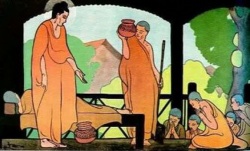Sickness
Sickness (ātaṅka, gelañña or roga) is the malfunctioning of the organism due to infection or injury. Numerous types of sickness are mentioned in the Buddhist scriptures including jaundice (paṇḍuroga), fever (pariḷāha), ulcers (aru), cough (ukkāsana), hay fever (tiṇapupphaka), diabetes (madhumehika) and leprosy (kuṭṭha). If every sickness were caused by past kamma, as some misinformed Buddhists maintain, then taking medicine would be pointless. But the Buddha listed eight causes of sickness, only one of which is the result of kamma, the others being imbalance of bile, phlegm or wind or all three bodily humours; change in the weather, improper care and accidents (S.IV,230). In another place he said that a poor diet can also lead to sickness (A.III,144) as can overeating (M.I,473). Seasonal sicknesses caused by the wind, heat or humidity were also recognized (Vin.I,199). According to legend, seeing a sick man was one of the four sights that led to Prince Siddhattha deciding to renounce the world and search for the Truth.
The Buddha defined health (appābādhatā or ārogya) as ‘having well-being, good digestion, not being over-cold or over-hot, balance and being capable of activity’ (A.III,103). He considered good health to be a true blessing and an important prerequisite for practising the Dhamma saying: ‘Good health is the highest gain.’ (Dhp.204). He advocated a light diet because it contributes to ‘freedom from illness, to health, to strength and to bodily ease’ (M.I,473) and he was aware of the connection between exercise and health (A.III,30; Vin.II,119). He also asked his disciples to contemplate the blessings of having good health and to use the opportunity to practise the Dhamma (A.III,103). Emphasizing the connection between personal virtue and health, the Bhesajjamañjūsā, an ancient Buddhist medical work, says: ‘The person who adheres to healthy food habits and behaviour, who is circumspect, not attached to worldly pleasures, generous, equally disposed towards others, truthful, forgiving and who associates with the wise, will be free from illness.’
The Buddha said that employers have an obligation to look after their employees when they are sick (D.III,191). He considered visiting and caring for the sick to be virtuous acts and out of compassion he did both. He once said: ‘He who would nurse me, should nurse the sick’ (Yo bhikkhave maṃ upaṭṭaheyya so gilānaṃ upaṭṭhahissati, Vin.I,301-2). Commenting on these words, the Saddhammopāyana says: ‘Nursing the sick was much praised by the Great Compassionate One and is it a wonder that he would do so? For the Sage sees the welfare of others as his own and thus that he should act as a benefactor is no surprise. This is why attending to the sick has been praised by the Buddha. One practising great virtue should have loving concern for others.’ See Doctors.
Asceticism and Healing in Ancient India, K.G. Zysk, 1989.
